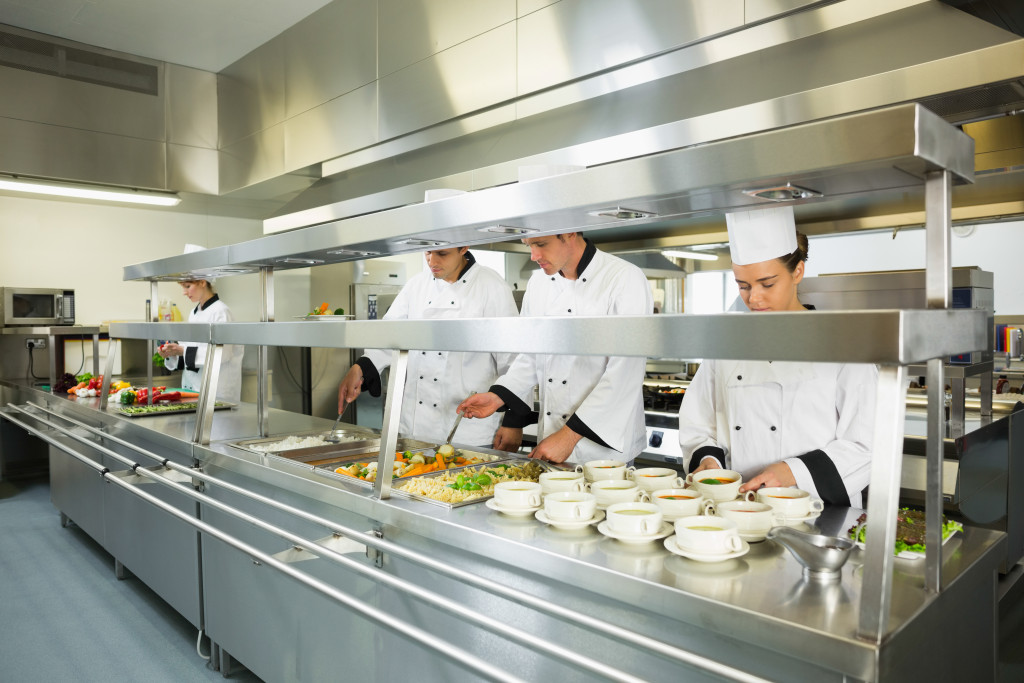- Implement a HACCP program to identify potential hazards and control them.
- Ensure the kitchen is clean, sanitized, and pest-free.
- Monitor food temperatures and train staff on proper methods for handling, storing, and serving food.
- Regularly inspect supplies for quality and safety and check expiration dates.
- Train staff on food safety standards to protect customers and reduce liability.
Running a restaurant is about serving delicious dishes to customers and ensuring their safety. Food safety in restaurants is a top priority for customers, and for a good reason.
A single case of food poisoning can severely damage your restaurant’s reputation and put your customers’ health at risk. As a restaurant owner, you must guarantee your food is free of harmful pathogens and toxins. This blog post will go over the essential steps you can take to ensure food safety in your restaurant.
Implement a HACCP program
Hazard Analysis and Critical Control Points (HACCP) is a system that identifies potential hazards in food production and puts control measures in place to prevent them. Implementing a HACCP program in your restaurant can help you identify areas of risk in your kitchen and take remedial action before problems arise.
In addition, a HACCP program should include an effective record-keeping system to ensure that all food safety procedures are followed.
Keep your kitchen clean
Maintaining a clean kitchen is crucial in preventing the spread of bacteria and other pathogens. Train your staff on cleaning and sanitizing surfaces, utensils, and equipment. Ensure that every area of your kitchen is regularly cleaned, and develop a schedule to ensure that nothing falls through the cracks.
Another way to keep your kitchen clean is by enlisting professional pest control services at least twice a year. Pests can carry germs that can contaminate your food, so it’s essential to take proactive measures to keep them under control.
Monitor food temperatures

Monitoring food temperatures is one of the most critical steps in ensuring food safety in your restaurant. Keep a food thermometer on hand to check the temperature of cooked food, and ensure that your refrigerators and freezers are running at the correct temperatures. This will help prevent food spoilage and the growth of harmful bacteria.
Moreover, remember to train your staff on the proper methods for handling, storing, and serving food. This will help you ensure that all the food served in your restaurant is safe and contamination-free.
Regularly inspect your supplies
It’s essential to regularly inspect the supplies and ingredients in your restaurant to ensure they are high quality and safe to consume. Check the expiration dates of all components, and review the labels to confirm that they were stored properly. Inspect your meat and produce for signs of spoilage before using them in your dishes.
Train your staff on food safety standards

As a restaurant owner, you know that food safety is critical to running a successful establishment. Ensuring that your staff is trained on food safety standards is not only a legal requirement but also essential for the health and well-being of your customers.
Protects your customers
By training your staff on food safety standards, you’re taking the necessary measures to protect your customers from foodborne illnesses. Your team will learn how to handle, store, and cook food properly, reducing the chances of cross-contamination or other food-related hazards that could make your customers sick.
Reduces your liability
If a customer gets sick due to improperly prepared food at your restaurant, it could cost you significant legal costs, lost business, and reputation damage. Training your staff on food safety standards reduces your liability in case something goes wrong.
Builds staff confidence
A well-trained staff is a confident staff. When your employees know what they’re doing, they’re more likely to perform their duties correctly, leading to better quality food and satisfied customers. Proper training also helps to reduce staff turnover rates, as employees who feel valued and knowledgeable about their roles are more likely to stay with the company.
Improves efficiency
Training your staff on food safety standards also improves the efficiency of your operations. Your employees will learn how to work smarter and faster while still adhering to food safety standards, leading to a more streamlined process in the kitchen.
Final thoughts
Food safety is an essential component of running a successful restaurant. By taking the necessary steps, such as training your staff, implementing a HACCP program, keeping your kitchen clean, monitoring food temperatures, and regularly inspecting your supplies, you can protect the health of your customers and ensure that they keep coming back. Remember, one instance of food poisoning can harm your restaurant’s reputation, so it’s critical to prioritize food safety every step of the way.

